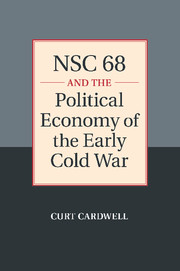Book contents
- Frontmatter
- Contents
- Acknowledgments
- Abbreviations
- Introduction
- 1 NSC 68 and the Problem of Origins
- 2 Multilateralism, the Soviet Threat, and the Origins of the Cold War
- 3 Multilateralism, the Dollar Gap, and the Origins of the Cold War
- 4 The Dollar Gap and Its Discontents
- 5 The British Sterling-Dollar Crisis of 1949–1950
- 6 The Origins and Development of NSC 68
- 7 The Political Economy of Rearmament
- Conclusion
- Select Bibliography
- Index
- References
7 - The Political Economy of Rearmament
Published online by Cambridge University Press: 05 July 2011
- Frontmatter
- Contents
- Acknowledgments
- Abbreviations
- Introduction
- 1 NSC 68 and the Problem of Origins
- 2 Multilateralism, the Soviet Threat, and the Origins of the Cold War
- 3 Multilateralism, the Dollar Gap, and the Origins of the Cold War
- 4 The Dollar Gap and Its Discontents
- 5 The British Sterling-Dollar Crisis of 1949–1950
- 6 The Origins and Development of NSC 68
- 7 The Political Economy of Rearmament
- Conclusion
- Select Bibliography
- Index
- References
Summary
Recent events have already made clear to a large part of Congress that the old ERP concept – i.e., economic aid for four years to achieve dollar viability – is to a considerable extent obsolete. The current dollar position of the sterling area, the fact that rearmament of the continental countries is inconsistent with rapid further improvement in their balances of payments, and the fact that certain countries (Austria, Greece, Italy) would, apart from rearmament, continue to require dollar assistance after 1952, have made the principal objective of ERP legislation (dollar viability in 1952) largely irrelevant as a basis for U.S. economic aid to Europe.
H. Van B. Cleveland, November 1950[E]xperience has demonstrated that the economic and technical side of foreign aid enjoys less popularity with the Congress than the military side.
A. G. Vigderman to John Ohly, July 1951The Congress will do anything in the world that the uniform services want them to do.
Dean Acheson, October 1953The Korean War broke the logjam on NSC 68. First, the decision to intervene in the war was made. Then, on July 19, 1950, Truman went before Congress and asked for a $10 billion supplement to the military budget and announced his intention to ask for greatly expanded military spending, including military assistance for foreign nations. This request should be seen as the beginning of NSC 68's implementation despite the fact that work on the paper continued for months and, indeed, under varying titles for years.
- Type
- Chapter
- Information
- NSC 68 and the Political Economy of the Early Cold War , pp. 211 - 258Publisher: Cambridge University PressPrint publication year: 2011

